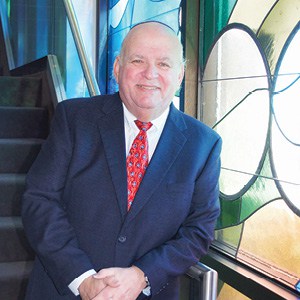Rabbi Murray Ezring
Rabbi Murray Ezring doesn’t hold a grudge. But he does get even.
Thirty-one years after he was a candidate to be the rabbi of Congregation Beth El in Norfolk, he is returning to Beth El to serve as an interim replacement for Rabbi Jeffrey Arnowitz, the man who succeeded Rabbi Arthur Ruberg, the man who got the job in 1988.
“I’ve hounded (then-president) Stuart Held ever since,” Rabbi Ezring, 68, quipped during a meet-and-greet with Beth El board members and trustees earlier this spring.
But seriously, folks, things never quite got that far. Rabbi Ezring, who had just completed 10 years at his first full-time pulpit in Ocean Township, N.J., says he received an offer from Boca Raton, Fla., before Beth El was ready to make an offer.
He served six years in Boca, where his parents lived, before deciding to take a job outside the rabbinate.
“When I went to sign the contract on my new job, my hand was shaking. I realized it was a sign that I should give it another try.”
Enter Temple Israel in Charlotte, N.C. Now, 25 years later, Temple Israel celebrated his retirement on Memorial Day weekend.
“It was so much more than we were prepared for,” Rabbi Ezring says of the Shabbat weekend. “It was unbelievable; we had over 300 in attendance on Friday night and more than 500 Saturday. It was all lay-led—from pre-schoolers to senior citizens.”
Rabbi Ezring, accompanied by his wife Barbara, will begin his duties at Beth El in mid-July. Though renting a place in Ghent, they will maintain a home in Charlotte where they have two elderly parents in a nursing home. “I’ll be going back and forth a lot,” Barbara says.
So why retire from his full-time gig?
“I’ve served a couple of stints on the (USCJ) placement commission. It’s getting harder and harder to find rabbinical students who want a pulpit because it seems to be getting more difficult to work with lay leadership.”
After 43 years on the pulpit, Rabbi Ezring thought he could help bridge that gap. He calls the interim position “a healing rabbi.”
“It’s helping a congregation heal from political trauma or the sudden, unexpected loss of a rabbi.… Above all, I’m a pastor, so I thought it would be nice to pastor a congregation instead of individuals, although that’s still part of the job.”
Rabbi Ezring has already started down the introductory healing path at Beth El by meeting with board members and staff. He plans to expand the path to members of the congregation in a series of meetings.
“Just like a family situation, synagogues are all different, so I have to learn a little about the congregation before I can decide about how to handle Beth El. But I won’t be working in a vacuum; I will be working closely with the board and with families.”
Rabbi Ezring says his career has been influenced on two levels: one by his over 30-year friendship with Dr. Ron Wolfson, the “guru of relational Judaism.” At Ezring’s retirement Shabbat, Wolfson spoke to the Charlotte congregation, reminding folks what it means to be engaging.
“You must welcome everyone into the sanctuary; leave your seats to welcome the newcomer,” Rabbi Ezring says of the message.
On a second level, Rabbi Ezring says he has always been involved in civil rights, immigration, and poverty because “welcoming the stranger is such an important concept in Judaism.”
As for his rabbinic style, Ezring says he spends little time on the bimah.
“I like to walk the aisles. I want people to feel engaged with me physically and orally.”
As an interim rabbi, Ezring says he is charged with getting the congregation in the right frame of mind to hire a full-time replacement. He has gone through extensive training for the position and is actually not allowed to take the job.
“If I do my job well, then Beth El will be positioned to hire a good rabbi who wants to move in the same direction that the congregation wants to move.”
It’s a careful dance—deciding to address such subjects as instrumental music, longer/shorter services, more or less tradition, lay or staff davening, and interfaith participation.
“I’m not going to tell you where to go. These are all important questions for a congregation to decide.”
And what about his future?
“Maybe I’ll decide to be a congregation president,” he says with a laugh.
Mark Kozak

